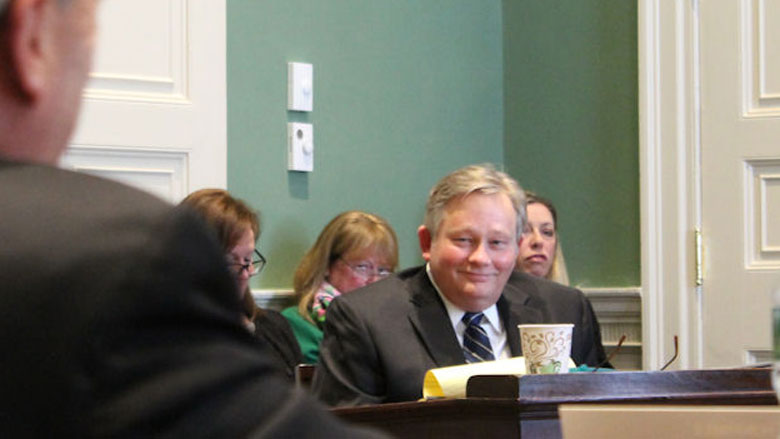Superior Court nominee knocked for lack of criminal law experience
By State House News Service | March 24, 2016, 6:50 EDT
 Governor’s Council holds a confirmation hearing on Gov. Charlie Baker’s Superior Court nominee Joseph Leighton. [Photo: Antonio Caban/SHNS]
Governor’s Council holds a confirmation hearing on Gov. Charlie Baker’s Superior Court nominee Joseph Leighton. [Photo: Antonio Caban/SHNS] STATE HOUSE — A civil litigator nominated for a seat on the Superior Court faced questions Wednesday about how he would determine criminal sentences, his understanding of addiction and whether representing clients on behalf of insurance firms would prepare him for the position.
“I don’t know if you know enough about drugs,” suggested Marilyn Devaney, a Watertown Democrat and member of the eight-person elected Governor’s Council that vets and votes on judicial nominees.
“I believe that addiction is a medical condition, and I believe that incarceration is not the appropriate response to addiction,” said Joseph Leighton Jr., a partner at Wilson Elser and Gov. Charlie Baker’s choice for a seat on the Superior Court.
A 1985 graduate of Boston College Law School who first applied for a judgeship last year, Leighton told the council he had taken on cases in his career that had “public notoriety,” and brought witnesses Wednesday who had worked both with him and in opposition to him.
Peter Knight, an attorney who had worked against Leighton, said Leighton is pleasant and decent and possesses integrity.
“He has the highest characteristics of any trial lawyer,” Knight said.
Christine Knipper, an attorney at Wilson Elser, said Leighton is a “great mentor.”
Councilor Eileen Duff, a Gloucester Democrat, pressed Leighton on his legal work for contractors on the Big Dig and keyed in on his work with AIG – one of the principals in the 2008 economic collapse.
“Let’s face it, you know, insurance companies haven’t done the people of this country or this commonwealth any favors with how they litigate these cases and how they eventually stick the common Joe – stick it to him,” said Duff. She also said, “Your application and resume seem quite thin for this position.”
Leighton explained that while paid by insurers, he would work on behalf of parties paying for the insurance, often a contractor. A lawyer in private practice for three decades, Leighton said the insurance defense work he focused on presented a wide variety of situations to litigate and said he also worked for plaintiffs.
Councilor Jennie Caissie, the lone Republican on the council, quizzed Leighton about gun rights and about an answer he had given in his application, disclosing that he had participated with a group that practiced discrimination against gay people, the Boy Scouts of America.
Leighton said he was glad his local Cohasset troop did not abide by the recent national policy of discriminating against gay scout leaders even though the policy had been upheld by the U.S. Supreme Court.
“I have a problem with that because it sounds to me in a judicial application you are snubbing your nose in some respects to a United States Supreme Court decision, whether we agree with it or not, by applauding a local organization’s disregard for that decision in their local exercise of their Boy Scout troop,” Caissie told Leighton.
“The Supreme Court allowed this form of discrimination. That’s very different from ordering them to discriminate,” Leighton responded.
Caissie told the News Service it appeared the local troop had disregarded the national policy even though it was deemed lawful by the Supreme Court and she thought it was an “odd thing to put in your application,” suggesting it might have been included “to score political points.”
Caissie said she was “more concerned” by Leighton’s lack of criminal law experience, and said she did not know how she would vote on his nomination.
Superior Court Judge Maynard Kirpalani told the council he also lacked criminal law experience before becoming a judge and was trained on the bench.
“They wouldn’t let me anywhere near a criminal courtroom for two years,” Kirpalani said.
Councilor Terrence Kennedy, a Lynnfield Democrat and defense attorney, questioned Leighton’s ability to order criminal sentences, and advised him to throw away the state’s non-binding sentencing guidelines, calling them “garbage.”
“That’s one of my big issues with you is you have no idea whatsoever what goes into a criminal sentence,” Kennedy said.
— Written by Andy Metzger
Copyright State House News Service









